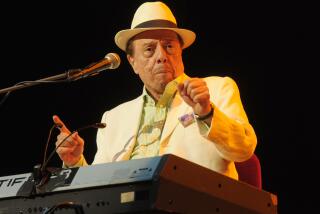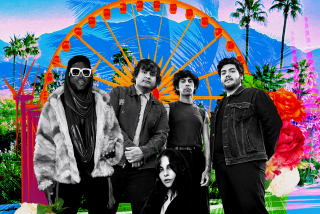Divas and samba, for a good cause
The Ford Amphitheatre kicked off its 2004 summer season Saturday night with a characteristically colorful program, overflowing with delightful sounds and images.
“Brazil, Women Sing for Life” featured a lineup of the Southland’s finest Brazilian artists: Flora Purim and Airto Moreira, Katia Moraes, Ana Gazzola and Sonia Santos’ Brasil, Brazil ensemble, and youthful talents Diana and Krishna Booker. Headlining the evening, the galvanizing Brazilian diva Elba Ramalho made one of her rare U.S. appearances.
That’s a large plateful of talent by any estimation, and the well-paced evening, despite its 3 1/2-hour length, was a compelling musical experience from start to finish.
Ramalho’s program was filled with the briskly rhythmic hit songs that have made her a major international star. Despite her consummate Brazil-ness, however, despite the sensual northeastern Brazilian sounds and textures that energized her music, the references that came to mind in her performance were Madonna and Tina Turner. Similarly dynamic, equally charismatic, Ramalho roved the stage with the restless energy of a feral feline. Garbed in a diaphanous gown, constantly tossing her profuse mane of blond hair, spinning around with a graceful intensity that Fleetwood Mac’s Stevie Nicks would surely have envied, she was a stunning display of music in motion.
Purim and Moreira -- superb jazz artists -- underscored the intimate linkages between Brazilian music and American jazz in a dynamic rendering of Chick Corea’s “Open Your Eyes, You Can Fly.” Purim’s voice, once a vital element in Corea’s Return to Forever band, continues to be one of the marvels of contemporary music, whether singing airy Brazilian lines or scatting through contemporary jazz rap. Moreira added an astonishing solo improvisation, singing, playing a tambourine and building to a climax in which he convincingly simulated the sound of an entire samba percussion ensemble. The captivating set climaxed with the Bookers joining in for a wildly eclectic combination of rap, samba and sheer, uncategorizable musical excitement.
Gazzola and Santos have developed a musical formula based on a slick, well-crafted display of movement and music. Their vocal togetherness as brightly colored as their outfits, they pulled the full house into their music via sing-along passages, at one point transforming Antonio Carlos Jobim’s familiar “So Danco Samba” with their own jazz-tinged lyrics and rhythms.
Amid the high-spirited, dancing-in-the-aisles exuberance, the most poignant moment of the evening came during Moraes’ set. Always dynamic, matching her spirited vocals with vigorous dance steps, she paused toward the end of her program to introduce an original song titled “19,” a deeply personal reminiscence of a sexual attack experienced when she was still a teenager. The touching number was a vivid reminder of the underlying purpose of “Brazil, Women Sing for Life” as a benefit performance, its proceeds funding efforts by the Brazilian Women’s Group and the Maria Mulher Foundation in their efforts to fight social and domestic violence against women in Brazil.
More to Read
The biggest entertainment stories
Get our big stories about Hollywood, film, television, music, arts, culture and more right in your inbox as soon as they publish.
You may occasionally receive promotional content from the Los Angeles Times.










